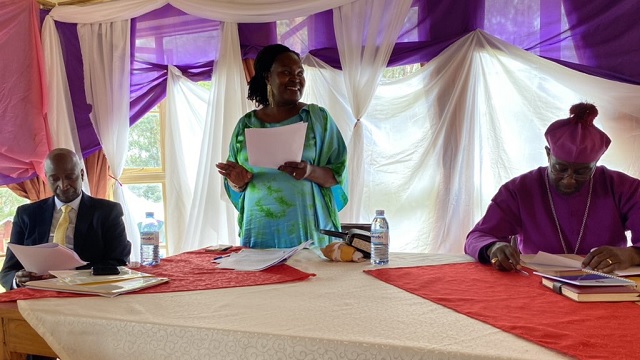
Kampala, Uganda | THE INDEPENDENT | The government is turning to churches to seek their support for the development of Uganda’s oil and gas sector.
Climate activists have stepped up their campaigns against the East African Crude Oil Pipeline (EACOP) by targeting the churches and have had an audience with the Pope in Vatican.
The activists who have also met other Vatican officials want the EACOP to be stopped over feared environmental concerns. The Catholic church considers environmental abuse a sin since 2016.
In response, Energy and Mineral Development Minister, Ruth Nankabirwa also met the House of Bishops of the Church of Uganda to rally its support to EACOP plus other oil and gas developments in the Albertine graben.
The House of Bishops is a strong body of the Church of Uganda comprising thirty-seven dioceses all over the country. At the meeting held at the beginning of the week at Kabale Bushara Island, Nankabirwa asked the Bishops to support the development of Uganda’s oil and gas sector, given the significant positive impact, it is having and will continue to have on Uganda.
“The oil and gas sector can enhance Uganda’s economic and social development by providing access to affordable energy (access to electricity is 60% in urban areas and about 18% in rural areas), opportunities for decent employment, business, and skills development, increased fiscal revenues, and improved infrastructure,” she said.
Nankabirwa particularly hinted at the controversy regarding the East Africa Crude Oil Pipeline which is generally being used to campaign against the planned extraction of oil and gas in the Albertine. The EACOP is a 1,443km crude oil export pipeline that will transport Uganda’s crude oil from Kabaale-Hoima in Uganda to the Chongoleani peninsula near Tanga port in Tanzania.
The minister told the Bishops that the concerns by climate and justice campaigners were based on what she described as deliberate misrepresentations of facts. Some petitions that URN has come across say the EACOP will lead to significant human rights and environmental risks. Others have claimed that compensation rates for Project Affected Persons(PAPs) were unfair.
While TotalEnergies, which is developing the pipeline with China National Offshore Oil Corporation (CNOOC), has pledged to minimize the environmental and human impact of the project, environmental campaigners continue to oppose it.
The Executive Director Petroleum Authority of Uganda Ernest Rubondo who also spoke at the meeting emphasized that the land acquisition process has been done in accordance with the laws.
“The land acquisition process provides for a 30% disturbance allowance and now an additional 15% payment per year, over and above the approved compensation to cater for the delays. All affected persons will be compensated by end of 2022,” said Rubondo.
Rubondo said: “The Project Affected Persons (PAPs) have been compensated or resettled and are undertaking livelihood restoration projects in agriculture, financial literacy, vocational skills, among others. No land will be utilised by the project before the compensation processes are concluded.”
The Archbishop, His Grace the Most Rev. Dr. Stephen Kaziimba Mugalu said the church needed information so as to adequately guide.
He said, “This calls on us to be good stewards and ensure proper management of the God given earthly wealth. As the church, we must provide the oversight and guidance required, and that is why we need this knowledge. Without knowledge, people perish.”
Bishop Nathan Ahimbisibwe of Ankole South diocese appreciated the efforts being undertaken by the government in developing Uganda’s oil and gas sector.
“If this treasure is well managed, Uganda will see socio-economic progress,” the bishop said.
The church leaders urged the government to ensure that the benefits are seen by the local communities through positive discrimination, but also ensure that Uganda as a country reaps from the oil and gas sector.
They reiterated their support for the project, given the information shared and urged the government to continue sensitising Ugandans including leaders of the local governments.
Opposition against EACOP has intensified since the beginning of February when the joint venture partners took a Final Investment Decision(FID) on the pipeline (EACOP) and the oil fields that will feed it.
On May 24th, environmental activists including Ugandan Vanessa Nakate, recently visited the Vatican Dicastery for Promoting Integral Human Development (PIHD).
One of its leaders condemned the construction of the East African Crude Oil Pipeline (EACOP) also known as the Uganda–Tanzania Crude Oil Pipeline (UTCOP). It is not yet clear whether the Minister and the Petroleum Authority of Uganda (PAU) plan similar visits in defense of Uganda’s oil and gas project developments.
While Uganda has committed to carbon emission reduction strategies and generally the energy transition, it has defended the development of its vast oil and gas resources.
In 2006, commercial quantities of oil were confirmed to exist in the Lake Albert basin in Uganda. The oil companies in Uganda, CNOOC Ltd, TotalEnergies and Tullow Plc completed the exploration phase.
In November 2020, TotalEnergies finalized the acquisition of Tullow’s entire interests in Uganda Lake Albert development project including the East African Crude Oil Pipeline.
TotalEnergies, now the majority shareholder and CNOOC are now headed into development phase, which will consequently lead to the production of Uganda’s oil. Once produced, part of the crude oil will be refined in Uganda to supply the local market and part will be exported to the international market. The export to the international market will be through an export crude oil pipeline.
The East Africa Crude Oil Export Pipeline will be constructed and operated through a pipeline company with shareholding from the Uganda National Oil Company, the Tanzania Petroleum Development Corporation and the two oil companies; TotalEnergies and CNOOC.
*****
URN
The post Minister turns to churches for support amidst opposition to EACOP appeared first on The Independent Uganda:.
from The Independent Uganda: https://ift.tt/YrdBPIH
0 Comments